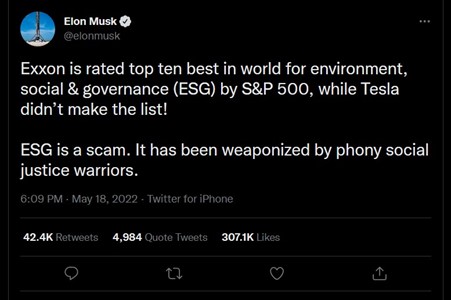Time and time again, headlines appear about ESG greenwashing or overblown advertising for sustainable products, subsequently sanctioned by courts. The complaints about ESG go rampant: too little substance, too few results, too little (real) sustainability. What’s true about those criticisms – and what is overblown? Here comes our take at Via Tomorrow:

This tweet flared up a fierce debate about ESG and its overall usefulness in May this year. Tesla CEO Elon Musk is not alone in his criticism, especially in the U.S. Several Republicans, including former U.S. Vice President Mike Pence or Florida Governor Ron DeSantis, have repeatedly criticized ESG fiercely. For example, Mike Pence described ESG as a tactic from the political left to use in “corporate America to push the radical environmental and social agenda” that otherwise would not be achieved at the ballot box.
But critical voices about ESG are also being raised elsewhere. As recently as July, The Economist published a very critical “Special Report” on ESG. Many journals report on greenwashing or investor churn in ESG funds. Headlines such as DWS’s greenwashing are causing discontent and uncertainty in the capital market and also cast a poor light on the efforts of companies to integrate ESG criteria into their daily operations. The bottom line of all criticism: ESG is not a bad idea in and of itself, but an incredible amount still needs to be done to make it a meaningful tool for corporate sustainability. But what exactly are the claims brought up against ESG?
The 4 biggest ESG criticisms
1. ESG reporting is not comparable
The criticism: ESG reports are not comparable and, accordingly, companies only report on activities that present them in the most favorable light possible. Other areas are simply considered less closely. And reporting criteria are individually designed to give the company a competitive advantage.
This accusation is currently still quite true. To date, there are no widely applied international standards for proper ESG reporting. But the prospect of improvement is there: the International Sustainability Standards Board (ISSB) of the IFRS, among others, is soon to issue uniform ESG reporting standards. The first draft is expected by the end of 2022. Standardized ESG reporting requirements, will allow rating agencies and consumers to gain a better understanding of companies and their sustainability activities.
The criticism: After the latest investigations at Goldman Sachs as well as DWS last year, accusations of greenwashing were quick at hand. And rightfully so: The ongoing investigations substantiate the impression that false promises have been gladly made. That damages the whole industry’s reputation. But is this true for all companies that have made sustainability their mission statement? Certainly not. As in many cases, it must be assessed individually whether a company’s promises are realistic and credible. Best suited for this purpose: the annually published sustainability reports. The report provides a breakdown of the company’s commitment to environmental and climate protection and social factors, and the extent to which measures have been taken or projects implemented. This is the only way for recipients to form their own opinions about the companies’ efforts.
The criticism: Reporting about ESG is important, but what good are sustainability reports if all the talk is not followed by concrete actions that actually bring about change?
Here, too, it is important to see both sides of the coin. After all, if we don’t know what companies are really doing in terms of sustainability, we as partners or consumers won’t be able to get an overview of which companies we want to continue to support. Standardized reporting is the foundation for comparability. Only based on comparable reporting a decision can be made which companies should continue to be supported and which should not.
The criticism: This statement comes, as already mentioned at the beginning, mainly from Republicans in the USA. ESG is damaging to business and was simply made to push an ideological agenda.
This criticism is problematic in two ways. The approach of some Republicans to simply ban ESG-promoting companies in their respective state works counter to their own reasoning. How is an economic system supposed to flourish if some companies are excluded from the market? In addition, this is also a clear signal to other companies – anyone who cares about the climate is not welcome here.
The second point is of fundamental nature: do we want to continue to support companies whose business model is based on the exploitation of people and planetary resources? According to studies, climate change harms the economy more in the long term than it would be worthwhile to continue operating in this way. In its 1972 report “Limits to Growth”, the Club of Rome described precisely this problem: the resources of our earth are limited.
In a nutshell: Why the overall criticism is exaggerated

While all of these criticisms are justified in principle, they all lack one crucial ingredient: a viable alternative to what ESG currently (still) is. Not only politicians, NGOs and individuals, but also companies must do more to address the major environmental and social challenges of the present and future.
So anyone who calls for simply doing away with what “ESG” stands for is overshooting the mark. There can only be two reasons for this. On the one hand, ignorance of the importance of environmental, social and corporate governance issues. Or simply too much impatience that adjustments in ESG cannot happen overnight. People tend to forget that the development of uniform and reliable financial (reporting) standards, which seem self-evident today, took many decades – and was driven by much bigger scandals than those found in the ESG sector today. One thing is clear, however: it should not take decades for non-financial indicators to be consolidated and standardized – but a little more patience would be desirable. And perhaps the most vehement ESG critics should devote their energy to making ESG better rather than just try to destroy it …
You’re already convinced of the importance of ESG? Then feel free to get in touch – we will support you efficiently and pragmatically with your next steps!




